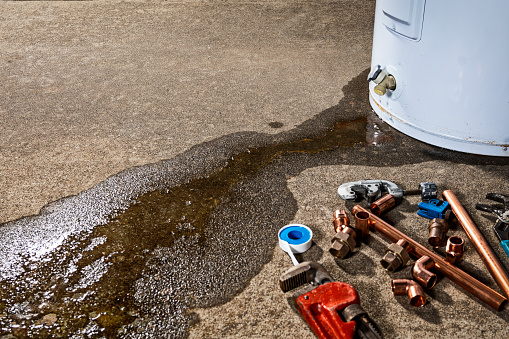If there is one thing you should learn about water heaters, even the best ones can leak. A leaking water heater doesn’t need replacement all the time. At times, it means you’ll need to do some quick fixing to stop the leak. And remember, even a small amount of water leaking can cause damage to your unit.
But here’s the tricky part when it comes to water heater leaks. Some can be treated by simply tightening the connections. While other cases are serious, they need to be done by professionals.
So, it always starts with a keen assessment:
Assessing your water heater
First off, you’ll have to find where the leak is coming from. See where the water accumulates. Clean the water and do a little inspection in the area. In that way, you’ll know where the potential leak came from.

Water leaking from the plastic faucet on a residential electric water heater sitting on a concrete floor with a red pipe wrench, tubing cutters, teflon tape and copper fittings in the foreground to repair or place the appliance.
But if you can’t detect the leak right away, there is one trick you can do. Place some paper towels where you found the water and let it stay for a few hours or a day. If the towel is wet when you come back, then the problem lies in your water heater.
If you’ve determined the location of the leak, then it is time to do the following steps to confirm it:
- Turn off the power supply. Shut your electric water heater by using a circuit breaker. For gas heaters, it is easier to turn it off as it has a dedicated switch. Once you manage to turn it off, proceed to drain the tank.
- Turn off the water supply. Look for a dedicated shut-off valve to switch it off. Doing so can prevent more water from pouring.
- Determine the location of the leak. There are three parts to check for your assessment: the inlet and outlet, the pressure valve, and the tank itself (check for holes).
You can do DIY fixes when the problem is a leaking water connection.
This is the easiest one to repair. The water continuously flows in and out of the two pipes connected to your tank: the cold water inlet and hot water outlet. Hence, the problem may be that these are loose or detached.
Check the connections and see if there are spots where they are loose. Bust out your wrench and tighten them. This could get rid of the leaking issue.
What if the problem is the valve itself?
This isn’t an easy problem because the issue may involve a broken valve. In that case, there has to be a replacement done on the valve. However, this is not a DIY fix because you may injure yourself if you push on fixing it. A more skilled and experienced professional plumber can handle this repair.
The tank itself is a problem.
Especially if the tank has a sizable hole, the unit no longer works. You need to invest in a new water heater and call a professional to install it for you.
If all things fail, call our plumbers at SPS!
Water heater leak is a problem that needs to be addressed as soon as possible. That is why a quick and careful assessment must be done. After the assessment, there are a few fixes you can do if the problem has been the water connection all along. But if the issue involves a broken valve or the entire tank itself, call a water heater repair professional.
SPS Plumbing has worked with different households to repair and replace when needed. Contact us at 408-622-8183 (South Bay Area) or 209-597-9107 (Central Valley) for your water heater repair and replacement in San Jose.

